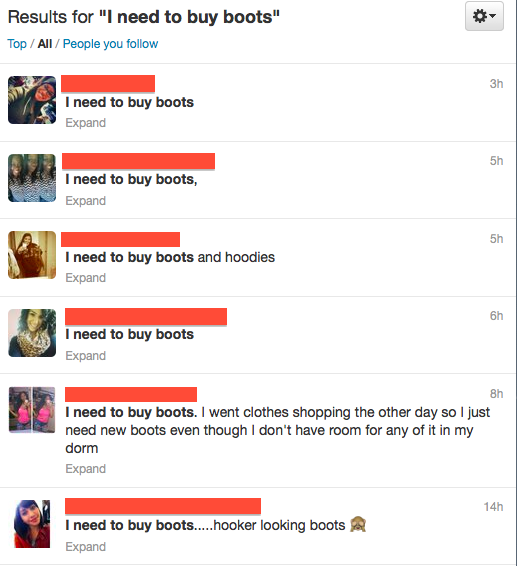Founders often tell me they don't have the time or money to properly invest in social media. Their startups are bootstrapped, every dollar and minute counts and they don't see the ROI of social media because people aren't engaging with their posts. For the sake of this article, I'm actually going to accept that answer (though I believe in many ways it's fundamentally missing the point). The truth is, social media can be used as an immediate sales tool, it's just not what it's best for. So for those of you that agree with the statement above, or even those that have a more complete approach to social media, but want to sell in the short term as well... here's the best advice I've got:
Sell With Your Ears
The search function on platforms like Twitter, Google Plus, and Pinterest allow you to listen to potential customers in ways that simply weren't possible in the past. Listening doesn't just mean responding to the people talking to you directly. That's a given, but you should be listening beyond that, monitoring the social graph for mentions of your brand and mentions of relevant keywords. The below are examples of low-hanging-fruit that are completely unresponded to. All it took to find these was typing "I need to buy" into the Twitter search bar and clicking "all". "I need to by" is obviously an extremely broad example, but I chose it to show the volume of intent to purchase that exists on the platform.
All of these were tweeted within two minutes of my search and 270 more were tweeted in the past hour. Leads can be expensive for businesses, and far too many are missing extremely warm leads that are right under their noses... and the noses of all their competitors (All the more reason to leverage listening on these social platforms).
Using the search function on platforms like Twitter, G+ and Pinterest allows you reach customers that are of the utmost relevance to your brand in the ultimate context. People are literally announcing to the world that they need your product and no one is answering them. Social listening should be thought of as an extension of customer service. Even if these customers aren't talking directly to you, they are talking, and talking in a place where it's culturally acceptable for you to join the conversation.
Some Example Responses:
Let's say your company sells shoes online. The below screenshot shows a Twitter search for "I need to buy boots"
Let's take the simplest of these tweets and explore what a response could look like:
Someone as well known as Zappos could @reply with: "Oh... hey there ;)" and the consumer may very well get a kick out of it and go to through Zappos' Twitter profile to Zappos.com to search for boots. If the consumer doesn't respond Zappos could follow up with an @reply like "What do you think of these? [link]".
Some would say you should put a link in the first tweet. I'm not completely opposed to that, but prefer a more personal approach and a follow up if you're not converting. I think the personal approach makes it more likely that this consumer won't feel she's being spammed, and more likely she'll follow you after clicking.
A smaller, less well known company could @reply with "Some would argue you can never have enough boots :) [link to boots section of your website]".
@Reply: "Don't see the problem here... lose the bed and sleep in a sea of boots!"
Conclusion
The truth is, social media is so much more than this. It's a better customer retention and awareness tool than it is a short-term sales tool, but that doesn't mean you should ignore the low hanging fruit. Tweets, posts, pins, etc. are data. Listen to this data and insert your brand into the conversation accordingly. Be relevant, be personable, and don't just spam everyone with the same message. At its core, social media is about the long run, building relationships, and lifetime value, but keep an eye out for the easy sale along the way.



